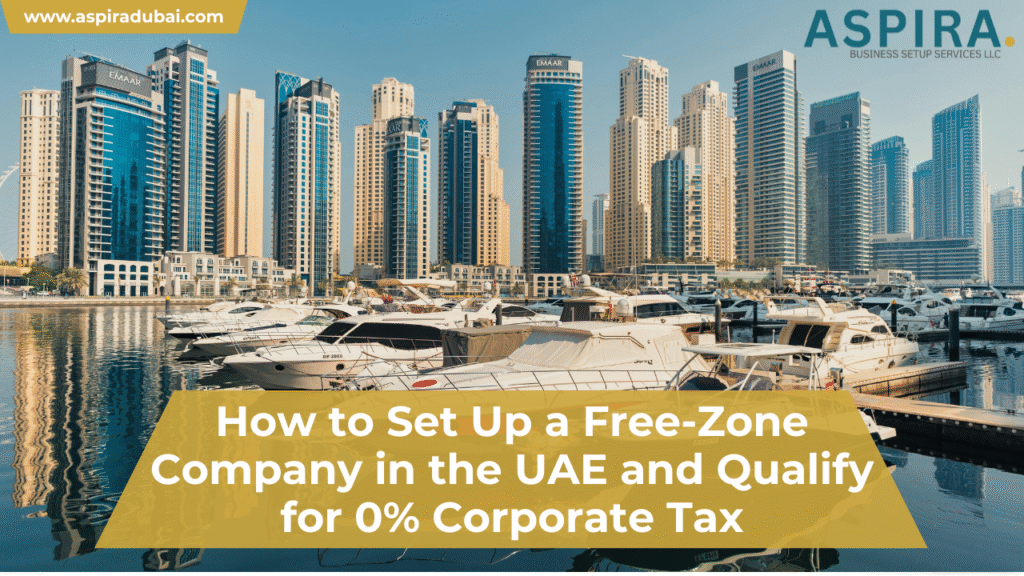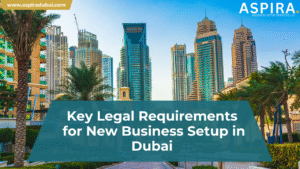For decades the United Arab Emirates attracted global entrepreneurs by offering a largely tax‑free environment, world‑class infrastructure and a strategic gateway between Europe, Asia and Africa. That reputation evolved when the UAE introduced a federal corporate tax in 2023. Mainland companies now pay 0 % on profits up to AED 375 000 and 9 % on profits above that threshold. Free‑zone companies can still access a 0 % corporate tax rate, but only if they meet strict conditions. Understanding those conditions—and structuring your business accordingly is the key to maintaining the tax advantage.
Dubai free zone company setup vs. Mainland: Key Differences Explained
Foreign ownership and control: Mainland companies often require a local partner for certain activities, though recent reforms allow 100 % foreign ownership in some sectors. In contrast, free‑zone companies can be wholly foreign owned from the start. This autonomy appeals to international investors who want full control over their enterprise.
Trading rights and tax implications: Mainland companies may sell directly to customers anywhere in the UAE without restrictions. Free‑zone companies can trade internally within the free zone or export goods and services abroad. To sell to mainland clients, a free‑zone company must work through a local distributor or open a mainland branch. Revenue from those mainland sales is taxed at the standard 9 % rate because it’s considered non qualifying income.
Customs and import duties: Goods imported into a free zone enjoy exemption from customs duties as long as they remain within the zone. Duties become payable only when goods are transferred into the mainland market. This duty‑free status can significantly reduce costs for trading and manufacturing businesses.
Licensing and regulatory environment: Each free zone is overseen by its own authority and offers a variety of licence types commercial, service or industrial. Free‑zone authorities typically provide a one‑stop shop for company formation, visa services and workspace leasing, which streamlines the setup process. Mainland licences, on the other hand, fall under various federal and emirate‑level regulators, making the process more complex.
What Makes a Qualifying Free Zone Person?
Not every free‑zone company automatically benefits from the 0% tax rate. To be considered a Qualifying Free Zone Person, your company must satisfy several criteria:
- Proper registration: The company must be incorporated or registered in a designated free zone and hold a valid free‑zone licence. Only designated zones are eligible for the special tax treatment, so it’s important to confirm your chosen zone is on the approved list.
- Adequate substance: The UAE authorities expect free‑zone companies to have a genuine economic presence. This means maintaining a physical office or workspace in the zone, hiring qualified employees who work on site, and incurring operational expenses locally. Shell companies with little substance will not qualify.
- Qualifying income sources: You must earn qualifying income, which typically includes:
- Transactions with other free‑zone entities (excluding activities like banking and insurance, which are outright disqualified).Revenue from specific activities outlined by government decisions, such as manufacturing, logistics and distribution services, fund management, aircraft leasing, ship management and holding company operations.Income from qualifying intellectual property (e.g. royalties from patents, trademarks or software developed in the UAE).Other income streams that pass a “de‑minimis” test (more on this below).
- No election for standard taxation: Companies must elect to be taxed under the free‑zone regime. If a company elects (or is forced) to follow the standard regime, it loses the ability to claim the 0% rate.
- Transfer‑pricing compliance: Related‑party transactions must reflect arm’s‑length market values. If your company is part of a larger group, intercompany sales, loans or management fees must be priced realistically and documented thoroughly.
- Audited financial statements: Even small free‑zone companies seeking the 0 % tax benefit are required to prepare audited accounts. These audited statements prove that your operations meet the substance requirements and that your income is properly classified as qualifying or non‑qualifying.
- De‑minimis rule adherence: The non‑qualifying portion of your income must not exceed 5 % of total revenue or AED 5 million, whichever is lower. If you exceed this threshold, your entire income qualifying and non‑qualifying will be taxed at the standard 9 % rate for that financial year.
Failing any one of these conditions immediately disqualifies your business from the 0 % rate, and you cannot regain qualifying status until the next tax period. Thus, careful planning and continuous monitoring are vital.
Detailed Steps to Establish and Operate Your Free‑Zone Company
1. Identify the right free zone and licence.
Free zones cater to different industries. The Dubai Multi Commodities Centre (DMCC) focuses on commodity trading and professional services. Dubai Internet City supports technology firms, while Jebel Ali Free Zone (JAFZA) is ideal for logistics and manufacturing. Research zones based on your sector, available facilities, visa quotas and whether the zone is designated for tax purposes.
2. Select a company structure.
- Free Zone Limited Liability Company (FZ‑LLC): Suitable for one or more shareholders, it provides a legal identity separate from its owners.
- Branch of an existing company: This allows a foreign or mainland company to operate under the free‑zone licence without incorporating a separate entity. Note that a branch’s liability attaches to its parent company.
3. Reserve your trade name.
Check that your chosen company name meets the naming conventions no offensive words, religious references or duplication of existing trade names. You can usually reserve a name online through the free‑zone authority’s portal.
4. Prepare and submit required documents.
Typical documentation includes:
- Completed application form from the free‑zone authority.
- Passport copies and visa pages of all shareholders and directors.
- A concise business plan detailing proposed activities.
- Proof of address for shareholders, and in some cases, a bank reference letter.
- A No‑Objection Certificate (NOC) from a current employer if a shareholder or manager holds a UAE residence visa.
If forming an FZ‑LLC, you’ll also need a memorandum and articles of association and possibly a board resolution authorising the formation.
5. Apply for the licence and lease premises.
Once documents are approved, you’ll receive a payment voucher. After settling the licence fee, you can sign a lease for office space or a flexi‑desk. Some free zones offer co‑working spaces and virtual office packages, but keep in mind that a physical presence is generally expected to meet substance requirements.
6. Receive your licence and Establishment Card.
The free‑zone authority issues your trade licence and an Establishment Card (also called a Company Immigration Card) that allows you to apply for visas for employees and shareholders. The entire process can take anywhere from a few days to several weeks, depending on the zone and completeness of your documentation.
7. Register for corporate tax.
All free‑zone companies whether or not they expect to pay tax must register with the Federal Tax Authority and obtain a tax registration number. This involves creating an online account on the FTA portal and submitting basic information about the company. Once registered, you must file a corporate tax return within nine months of the end of your financial year.
8. Open a corporate bank account.
Free‑zone companies enjoy easier access to local banking facilities compared to offshore firms. Each bank has its own compliance requirements; typically you’ll need copies of your licence, lease agreement, shareholder passports and board resolution, along with a description of your business activities and anticipated transaction volumes.
9. Maintain ongoing compliance.
- Operational substance: Ensure your core activities such as product assembly, order processing or service delivery take place within the free zone. Keep employment contracts, timesheets and payroll records to prove local operations.
- Financial record‑keeping: Maintain separate records of qualifying and non‑qualifying income. Document all transactions with related parties, including transfer‑pricing justification.
- Annual audit: Engage a registered auditor to prepare financial statements and submit them to the free‑zone authority and tax authorities, as required.
- Renew licences and visas: Free‑zone licences typically require annual renewal. Visa quotas depend on the size of your leased space; flexi‑desk holders may obtain only a limited number of visas.
Myths vs. Reality: Clearing Up Common Misconceptions
Myth: “All free‑zone companies are tax‑free.”
Fact: Only those that meet the stringent qualifying criteria can apply the 0 % rate to their qualifying income. If you provide services to mainland clients or engage in excluded activities, that income is taxed at 9 %.
Myth: “Small businesses don’t need audited accounts or transfer‑pricing reports.”
Fact: Every company seeking the zero rate must prepare audited financial statements and document related‑party transactions. Authorities are focused on economic substance and fair market valuations.
Myth: “Once you are tax‑free, you remain tax‑free forever.”
Fact: Status is reviewed annually. Exceeding the de‑minimis threshold or violating any conditions triggers the standard rate for that year. In some cases you may be barred from re‑entering the 0 % regime for several years.
Myth: “There’s no need to register with the FTA if you owe no tax.”
Fact: Registration and annual filing are mandatory for all free‑zone businesses, even if your final tax bill is zero. Failure to register or file on time can result in fines.
Myth: “You can form a tax group with your mainland subsidiary and still enjoy 0 %.”
Fact: Joining a tax group automatically shifts you into the standard 9 % regime. Free‑zone companies must remain separate to retain their tax benefits.
Insights and Best Practices That Many Guides Overlook
- De‑minimis planning: Because non‑qualifying revenue must stay below 5 % or AED 5 million, firms should monitor income streams monthly. If sales to mainland clients grow, consider spinning off that activity into a mainland branch.
- Transfer‑pricing documentation: It’s not enough to state that transactions are at market value. Prepare contemporaneous analyses such as benchmarking studies that justify intercompany pricing structures. This is particularly important if you receive management fees, royalty payments or loans from related entities.
- Recent tax reforms: Starting in 2025, large multinational enterprises may face a domestic minimum top‑up tax designed to align the UAE with international tax rules. If your group’s global turnover exceeds EUR 750 million, evaluate how free‑zone incentives interact with global minimum tax obligations.
- Industries with qualifying activities: Not all sectors are equally suited to free zones. Manufacturing, logistics, investment management, aircraft leasing and holding company structures often generate qualifying income. In contrast, conventional banking, insurance and real‑estate development typically do not qualify.
- Economic substance beyond office space: Having a flexi‑desk may suffice at first, but authorities are increasingly looking for employees, management and decision‑makers on the ground. Consider hiring locally and locating key management functions within the free zone.
Frequently Asked Questions
1. What is a designated free zone?
A designated free zone is one approved by the UAE government for special tax treatment. Companies registered in these zones may qualify for the 0 % corporate tax rate if they meet specific requirements.
2. Do I need a local partner to set up in a free zone?
No. Free‑zone companies can be 100 % foreign‑owned. This is one of the major advantages over certain mainland structures.
3. Can a free‑zone company sell directly to customers in the UAE mainland?
Yes, but such sales are considered non‑qualifying income and are subject to the standard 9 % corporate tax. Many companies use distributors or open a mainland branch for this purpose.
4. What happens if my non‑qualifying income exceeds the de‑minimis threshold?
If non‑qualifying income exceeds 5 % of total revenue or AED 5 million (whichever is lower), the entire income for that year is taxed at 9 %.
5. Are audited financial statements mandatory?
Yes. All companies seeking to benefit from the 0 % rate must prepare audited financial statements annually, regardless of size.
6. How long does the company formation process take?
Depending on the free zone and the completeness of your documentation, formation can take from a few days to a few weeks.
7. Do I need to register for corporate tax if I expect to pay zero tax?
Yes. Registration and annual filing are mandatory for all free‑zone companies, even if no tax is payable.
Conclusion: A Strategic Path to Tax Efficiency
Setting up in a UAE free zone remains one of the most attractive routes for entrepreneurs seeking a base in the Middle East. You gain full ownership, access to modern infrastructure, simplified visa processes and the opportunity to legally pay zero corporate tax on your qualifying income. However, these benefits come with obligations: demonstrating real economic substance, segregating qualifying and non‑qualifying activities, complying with transfer‑pricing rules and meeting filing deadlines. By following the detailed steps and best practices outlined above, you can confidently establish your free‑zone company, secure the coveted 0 % tax rate and position your business for sustainable growth.
Contact Us
Looking to apply for your Influencer or Advertiser Permit in the UAE? We simplify the process by handling trade license setup, influencer permit approval, and legal compliance — so you can focus on creating content and growing your business.
📌 Aspira Business Setup Services
📧 Email: info@aspiradubai.com
📞 Call/WhatsApp: +971 56 406 6546
🌐 Website: www.aspiradubai.com









